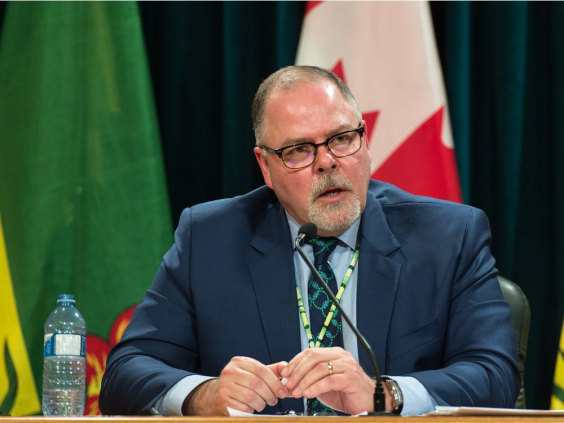Saskatchewan Health Authority (SHA) CEO Scott Livingstone addressed concerns about how vaccinations are rolling out in the province during a media availability on Thursday. Livingstone explained that the province is still working on strengthening processes and communication around availability.
“We are committed to a vaccine distribution process that is fast, fair, transparent and safe. As you have seen, we are making great strides in getting our infrastructure up quickly to manage higher volumes of vaccine as they arrive,” Livingstone said.
There have been as many as 4,000 vaccines delivered in a single day and he is confident Saskatchewan can deliver more that.
“As an example, out of those 4,000 vaccines that were delivered on the weekend, on Saturday, 3,300 were in rural and northern Saskatchewan and were not using our large vaccination capabilities in either Regina and Saskatoon,” Livingstone said.
In recent weeks, the process for notifying individuals 70-years-old and over has been a hot button issue for the SHA. Livingstone explained that in phase one of the rollout vaccines are distributed at community long-term care and personal care home residents and certain prioritized healthcare workers as a priority group.
“After those populations are vaccinated, local public health officers or officials will be establishing clinics for residents 70 plus. To fill these clinics, we are contacting eligible recipients wherever possible by phone based on their age and location until all available appointments are filled,” Livingstone said.
The subject of vaccination in Prince Albert was addressed during the regular councillor’s forum at the end of the city council meeting on Monday by Ward 5 Coun. Dennis Ogrodnick. He used part of his time in the forum to let the public know that public health was contacting people to get vaccinated in the city.
“So just for people that are watching, make sure you answer your phone when you see that unknown number because that is your chance to get vaccinated. And I thank the health district and public health for actually making it a lot easier for seniors to get vaccinated rather than posting it on social media and you have to phone in and hope to heck that you are one that gets in there and a lot of those seniors don’t have access to technology,” Ogrodnick said.
Priority sequencing continues in phase two as the oldest residents are contacted first and then descending ages are contacted.
“Note that the appointment availability is driven by vaccine availability. At this time there isn’t a clinic in the province that is able to receive enough vaccines to immunize all residents eligible in phase one. Once these appointments are filled, the clinic must be suspended until more vaccines are made available to the province,” the province said.
Livingstone explained that shifting vaccine availability creates challenges for residents who are aware of clinics but have not been contacted and for public health officials who have to shift each week because of lack of consistent supplies.
“We are currently looking at many ways to improve the booking process, not just for phase one but also phase two in the province and you will see some important changes very soon,” Livingstone said.
In the future, the system will be moving to residents contacting health authorities to choose a local vaccination site and vaccination time which will improve the process.
“It will still be hampered by a lack of vaccine supply — until that vaccine starts flowing in a consistent manner,” Livingstone said.
Livingstone explained that a website and phone number with this information will be available in the next 10 days.


